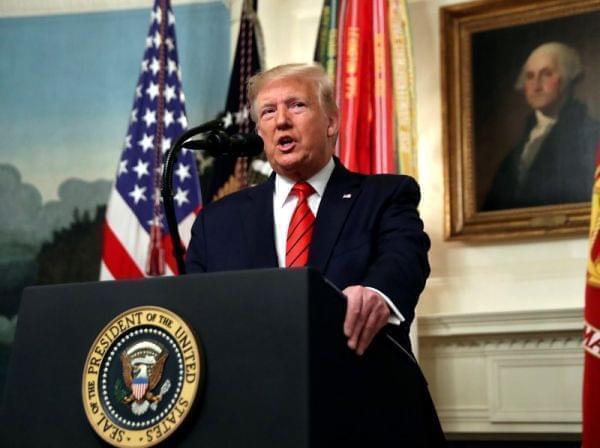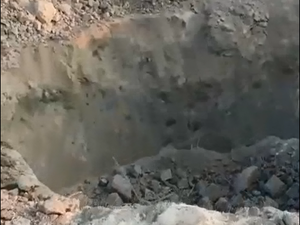Trump Says Islamic State Leader Was Killed In Special Operations Raid

President Donald Trump speaks in the Diplomatic Room of the White House in Washington, D.C., on Sunday. Andrew Harnik/AP
President Trump says that Abu Bakr al-Baghdadi, the founder and leader of the Islamic State, has been killed after a U.S. Special Operations mission targeted him in northwestern Syria. Trump declared that American forces have brought "the world's No. 1 terrorist leader to justice."
In a dangerous and daring night-time raid in "grand style," Trump said Sunday that Baghdadi died at the end of a tunnel when American forces cornered him in Idlib Province in northwestern Syria along the border with Turkey.
Baghdadi, who was with his three young children, detonated a suicide vest, killing himself and his children, Trump said.
Before his death, Trump said Baghdadi was "whimpering and crying and screaming all the way."
— Dan Scavino Jr.���� (@Scavino45) October 27, 2019
Trump said no American troops were killed in the raid.
"The United States has been searching for al-Baghdadi for many years. Capturing or killing al-Baghdadi, has been the top national security priority of my administration," Trump said on Sunday morning.
"He was a sick and depraved man, and now he's gone," Trump said.
War monitoring group the Syrian Observatory for Human Rights says U.S. forces attacked ISIS targets overnight in northwest Syria, leaving at least nine people dead.
Trump hinted that the announcement was coming Saturday evening, tweeting: "Something very big has just happened!"
The White Helmets, a group of volunteer rescue workers who have operated in the Syrian civil war, provided NPR with a video of what the group says was the site of the attack, including rubble surrounding what appeared to be a large bomb crater.
A rescue worker told NPR about 10 bodies were recovered from the site.

A video provided by Syria's White Helmets volunteers shows a crater where the attack took place.
The Observatory says eight helicopters and a warplane belonging to U.S.-led coalition forces fighting ISIS struck an area north of the Syrian city of Idlib, close to the Turkish border. Heavy strikes targeted ISIS positions for about two hours, with militants firing back at helicopters. The group says many people were wounded in the attack.
A White Helmets official told NPR a two-story building was targeted in the strike. In the video, the site appears fairly isolated, surrounded by a grove of trees, a few homes and desert mountains.
Abdi, the Kurdish commander, said in an earlier tweet that there was a "Successful& historical operation due to a joint intelligence work with the United States of America." The SDF had been an important ally to U.S. forces fighting ISIS.
Successful& historical operation due to a joint intelligence work with the United States of America.
— Mazloum Abdî مظلوم عبدي (@MazloumAbdi) October 27, 2019
Baghdadi has been reported killed several times before, including in announcements by Iraq and Russia. He was believed to be hiding out in the desert near the Syria-Iraq border.
His last apparent video appearance was in April, a month after U.S.-backed forces declared the end of the ISIS "caliphate" and the defeat of the last remaining territory the group held in the Syrian city of Baghouz.
Baghdadi's actual powers of command and control have been greatly diminished since the U.S. and coalition forces routed ISIS from its hold on large swaths of territory in Iraq and Syria, though he has remained symbolically powerful.
At the Kurdish-run al-Hol camp in northeastern Syria a few months ago, some of the Iraqi and Syrian wives of ISIS fighters told NPR they were waiting for Baghdadi to reappear and were confident he would revive the caliphate.
Declaring an "Islamic State"
Baghdadi's most notable public appearance came five years ago, near the height of ISIS' power in Iraq and Syria. He spoke at the Great Mosque of al-Nuri in Mosul in July 2014, declaring himself caliph of the new Islamic State.
At its height, ISIS ruled over 8 million people in territory the size of Great Britain, with its capital in Raqqa, Syria.
The group rose to prominence for its gruesome violence, releasing videos of beheadings and burning people alive. It publicly beheaded, crucified and threw people off of buildings. The group forced thousands of women and children from Iraq's Yazidi minority into slavery amid an ISIS campaign of genocide against the group. Yazidi women and girls were kept as sex slaves for years.
It attracted tens of thousands of foreigners, many from the West, and inspired terror groups around the globe. The group even established a quasi-government, with administrative functions, courts and police.
U.S. forces declared an end to ISIS' self-declared caliphate in March. But experts fear the group's resurgence now that Trump has announced a pullout of U.S. forces from Syria, with dozens of ISIS fighters escaping from Kurdish custody in the last month.
NPR's Daniel Estrin, Jane Arraf and Lama al-Arian contributed reporting.

